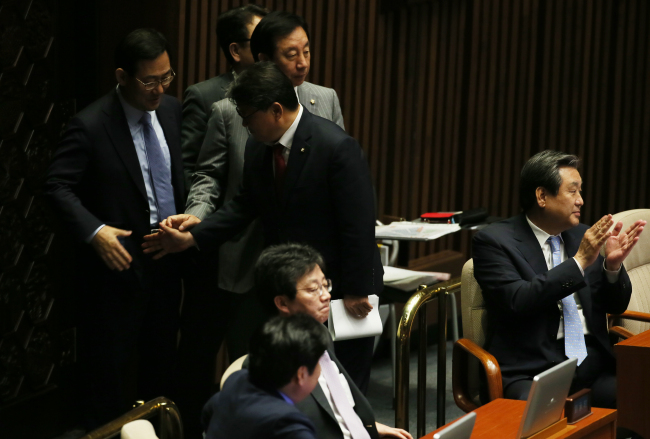The civil service pension reform passed the National Assembly early Friday after seven months of boisterous debate and turbulent negotiations, paving the way for the government to reduce subsidies for pensions paid to retired public officials as a way to alleviate the mounting national debt and tax burdens.
The parties endorsed the Amendments to the Public Officials Pension Act with 233 approval votes of the 246 lawmakers that gathered at the plenary session held in the wee hours due to extended negotiation. None disapproved, while 13 abstained. The Assembly also approved about 60 bills that had been stalled since April due to the partisan stalemate.
Various surveys have showed that the changes to the civil service pension will save the government 333 trillion won ($303 billion) over the next 70 years.
 |
| Saenuri Party leader Rep. Kim Moo-sung (right) claps as the plenary session wrapped up after some 60 bills, including the contentious civil pension reform, were endorsed early Friday at the National Assembly. (Yonhap) |
The reform will raise the contribution rate of public service pensions from 7 percent to 9 percent in the next five years, while reducing entitlements from 1.9 percent to 1.7 percent in stages over 20 years. It would also delay the first payment of public pensions by pushing back the retirement age from the 60 to 65.
While most of the details had been agreed upon via special committees and negotiations, the parties have been at loggerheads over the opposition’s demand that the civil service pension reforms be linked to revisions that would increase annuities from the national pension.
In connection with the civil servants’ pension reform endorsement, the parties voted to establish a special parliamentary committee and an organization encompassing the social sector to discuss ways to give a face-lift to the national pension fund.
Both bodies will be active until the end of October and the special committee could be extended for 25 more days if necessary.
The bills’ approval came after drawn-out talks Thursday between the ruling Saenuri Party and the main opposition New Politics Alliance for Democracy over a government enforcement decree of the special Sewol bill. The bill obliges the government to conduct investigations into the government’s failure to rescue over 300 passengers when the Sewol ferry sank in April 2014.
The NPAD had charged that the decree allows the government to meddle in the probes by placing public officials in the probe’s executive positions.
After hours of a tug-of-war, the parties agreed to a compromise deal allowing amendments to parliamentary rules to enable lawmakers to revise such decrees.
Their decision, however, was met with angry response from Cheong Wa Dae and some of the Saenuri Party members, who claimed revising the decree violates the Constitution, signaling yet another round of heavy political wrangling ahead.
The Saenuri Party had earlier in the day criticized the NPAD for holding scores of draft bills hostage to its demands.
“You cannot hold bills hostage for partisan interests,” Saenuri Rep. Cho Hae-jin had said. The NPAD has unnecessarily delayed reforms to the civil service pension and an array of economy-boosting legislations, Cho added.
The NPAD, despite its legislative minority, can stall bills from going to a plenary vote, as it holds the chairmanship of the Legislation and Judiciary Committee. The panel’s chairman is authorized to keep bills from plenary voting indefinitely.
By Jeong Hunny (hj257@heraldcorp.com)

